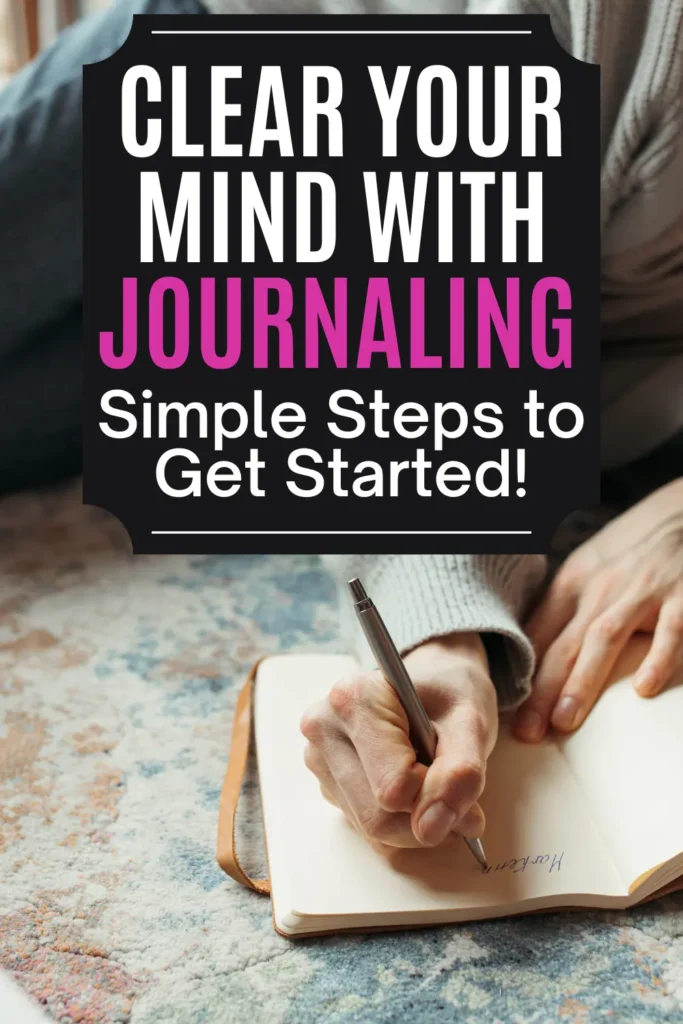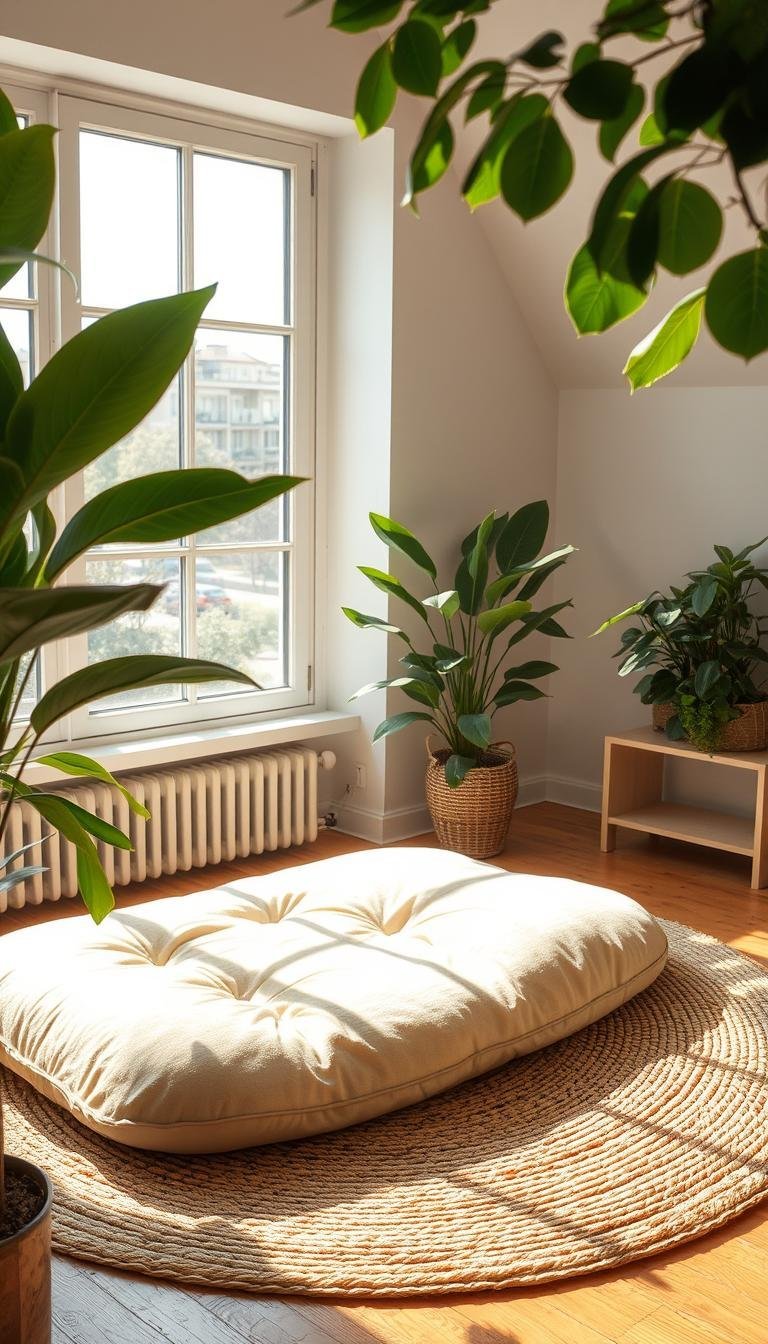(Hey! Some links in this post may be affiliate links — meaning I may earn a small commission if you buy through them, at no extra cost to you. As an Amazon Associate, I earn from qualifying purchases. I only share products I genuinely love and think you’ll find useful too. Read the full disclosure here).
Journaling is a great way to clear your mind. It’s simple to start and can make a big difference. By writing down your thoughts, you can reduce stress and focus better.
Journaling helps you understand yourself better. It’s a powerful tool for improving your mental health. We’ll show you how to start journaling for mental clarity.

Contents
- 1 What is Journaling and Its Benefits?
- 2 The Science Behind Journaling
- 3 Choosing Your Journaling Style
- 4 Setting Up Your Journaling Space
- 5 How to Start Your First Journal Entry
- 6 Establishing a Journaling Routine
- 7 Techniques to Enhance Clarity
- 8 Incorporating Prompts for Better Focus
- 9 Reviewing and Reflecting on Your Entries
- 10 Overcoming Common Challenges
- 11 The Long-Term Benefits of Journaling
What is Journaling and Its Benefits?
Journaling is a powerful tool for mental wellness. It helps people process their thoughts and feelings in a healthy way. By journaling daily, people can reduce stress and anxiety, improve their thinking, and grow emotionally.
Journaling means writing down your thoughts, feelings, and experiences regularly. It helps clarify your thoughts, understand your behaviors, and know yourself better. This leads to clearer thinking and a more fulfilling life, as you learn about your strengths and weaknesses.

- Improved mental wellness through journaling, leading to reduced stress and anxiety
- Enhanced emotional intelligence, allowing for better relationships and decision-making
- Increased self-awareness, enabling individuals to identify areas for personal growth and development
By embracing journaling, people can achieve mental clarity, emotional balance, and well-being. This leads to a more fulfilling and purpose-driven life.
The Science Behind Journaling
Journaling is good for your mental health. Research shows how it works on our minds and brains. By mental health journaling, we can understand ourselves better. This helps us feel clearer and less anxious or depressed.
Mindfulness journaling helps us know ourselves better. We learn about our values and goals. Writing down our thoughts helps us see patterns and change for the better.
- Reduced stress and anxiety
- Improved mood and emotional regulation
- Increased self-awareness and personal growth
- Enhanced cognitive function and mental clarity
Adding journaling to our daily life can make a big difference. It can lead to a more fulfilling life. Whether it’s mental health journaling or mindfulness journaling, journaling changes lives for the better.
Choosing Your Journaling Style
Finding the right journaling style can change your life. There are many ways to journal, and it’s key to try them out. Whether you want to clear your mind or express yourself, journaling can help.
Exploring different journaling styles takes time and patience. You might find that reflective journaling suits you. It helps you dive deep into your thoughts and feelings. Or, you might prefer expressive journaling, which lets you express your creativity and emotions.
Reflective Journaling
Reflective journaling helps you understand yourself better. It’s about looking at your thoughts, feelings, and experiences. This style can be very therapeutic, helping you deal with tough times.
Expressive Journaling
Expressive journaling is all about being creative and true to yourself. It lets you express your feelings and thoughts freely. This way, you can get to know your values and dreams better.

Bullet Journaling
Bullet journaling is a mix of reflective and expressive journaling. It uses symbols and layouts to organize your thoughts. This method lets you create a journal that fits your unique needs.
Setting Up Your Journaling Space
Creating a dedicated space for journaling can make a big difference. It should be comfy and help you relax and focus. This way, you can dive deep into the importance of journaling for mental health. Setting up this space helps you use journal prompts for mental health better.
Creating a Comfortable Environment
A comfy environment is key for good journaling. Find a quiet, private spot where you can write without distractions. Think about the lighting, temperature, and feel of the space to make it calm and relaxing.

Tools and Supplies You’ll Need
You’ll need some basic tools to start. These include a journal, a pen, and maybe a desk. The type of journal you choose, digital or paper, depends on what you like best. Each has its own benefits and drawbacks, so pick what suits you best.
How to Start Your First Journal Entry
Starting your journaling journey is exciting, and it’s great for mental clarity. Find a quiet, comfy spot to reflect without distractions. Mindfulness journaling means being in the moment, so breathe deeply and relax.
Your journal is a safe place for you to express yourself. Don’t worry about spelling or grammar. Just let your thoughts flow. Use prompts or write freely. The goal is to understand yourself better, not to write a perfect piece.

Tips for Getting Started
- Set aside a dedicated time and space for journaling
- Start with a clear intention and a willingness to be honest and authentic
- Use reflective prompts to guide your writing and tap into your thoughts and feelings
Reflective Prompts for Mental Clarity
Reflective prompts can help you start journaling. Write about your goals, what you’re grateful for, or challenges you face. Ask yourself questions like “What am I looking forward to?” or “What’s been on my mind?”
By adding journaling tips for mental clarity and mindfulness to your daily routine, you’ll understand yourself better. You’ll find more clarity and purpose. So, grab a pen and paper, and start your journaling journey today.
Establishing a Journaling Routine
To enjoy mental wellness through journaling, setting a regular routine is key. Choose a time that fits your schedule, like morning or before bed. Journaling helps you grow and boosts your mental clarity.
Consistency is important in journaling, but being flexible is also vital. Life changes, and your routine should too. This balance makes journaling a lasting, enjoyable part of your mental wellness.
Finding the Right Time
Finding the best time to journal takes some trial and error. Some like morning to set goals and clear their mind. Others prefer evening to unwind and reflect.

Journaling Frequency Recommendations
How often you journal depends on your needs and goals. Try to journal a few times a week, aiming for daily. Regular journaling brings many mental wellness benefits.
Techniques to Enhance Clarity
Journaling is a great way to clear your mind. There are many techniques to make it even better. These methods help you understand yourself and your world better.
Mind mapping and visualization use pictures to explore your thoughts. Gratitude journaling helps you see the good in life. It makes you feel more positive and clear-minded.
Stream of consciousness writing lets you write freely. It helps you reach deep insights. These techniques make journaling more effective and clear.

- Reflective journaling, which involves reflecting on your experiences and thoughts
- Expressive journaling, which involves expressing yourself creatively through writing or art
- Bullet journaling, which involves using bullet points and other visual aids to organize your thoughts and ideas
Using these techniques in your journaling can bring many benefits. You’ll gain mental clarity and a deeper understanding of yourself.
Incorporating Prompts for Better Focus
Journal prompts can help you focus and give direction to your journaling. They are key for mental health because they help you process thoughts and emotions. This leads to clarity and a better understanding of yourself.
It’s important to make prompts fit your personal needs and goals. Identify areas you want to improve or gain clarity in. Then, create prompts that guide you to explore these topics deeply and thoughtfully.
Sample Prompts for Mental Clarity
- What are my goals for the next month, and what steps can I take to achieve them?
- What are some things I’m grateful for in my life, and how can I cultivate more positivity?
- What are some challenges I’m currently facing, and what strategies can I use to overcome them?

Using these prompts and making them personal can enhance your self-awareness. It helps you gain clarity and approach journaling with intention.
Reviewing and Reflecting on Your Entries
As you keep journaling, it’s key to look back at your entries. This helps you spot patterns, themes, and insights. These can guide and improve your journaling. Journaling tips for mental clarity and mindfulness journaling help you understand yourself better.
When you review your entries, find the areas where you’ve grown. Celebrate your wins, no matter how small. This boosts your motivation to keep journaling.
- Analyze your entries for patterns and themes
- Celebrate your progress and accomplishments
- Adjust your approach as needed to continue growing and learning
By following these steps and using journaling tips for mental clarity and mindfulness journaling, you’ll grow in self-awareness and understanding.
Overcoming Common Challenges
Starting your mental health journaling journey can be tough. You might find it hard to begin with a blank page. Try using prompts or freewriting to spark your creativity. This can help you uncover hidden thoughts and feelings.
Staying motivated can also be a challenge. It’s important to set achievable goals and be gentle with yourself when you hit a roadblock. Remember, journaling is about growing your self-awareness, not creating a perfect piece of writing. Focus on the benefits like reduced stress and clearer thoughts to keep you going.
Common Obstacles to Journaling
- Dealing with a blank page
- Maintaining motivation
- Avoiding perfectionism
By facing these common hurdles and finding ways to overcome them, you can enhance your journaling practice. With dedication and patience, you’ll unlock journaling’s full benefits. You’ll see improvements in your mental clarity and overall well-being.

The Long-Term Benefits of Journaling
Starting a journaling habit can open up many long-term benefits. It goes beyond the initial mental clarity you feel. As you keep writing, you’ll see big changes in your personal growth.
Sustained Mental Clarity
Regular journaling helps you understand your thoughts, feelings, and habits better. This self-awareness leads to lasting mental clarity. It helps you make better choices, face challenges easier, and stay focused on your goals.
Personal Growth and Development
Journaling lets you explore yourself safely. You discover your values, dreams, and true self. This introspection gives you insights for personal growth and finding purpose.
Transforming Challenges into Opportunities
Journaling helps you see setbacks as chances for growth. It makes you more resilient and creative. This mindset shift is very empowering.
Journaling leads to a journey of self-discovery and change. It makes your life more meaningful, intentional, and true to yourself.












